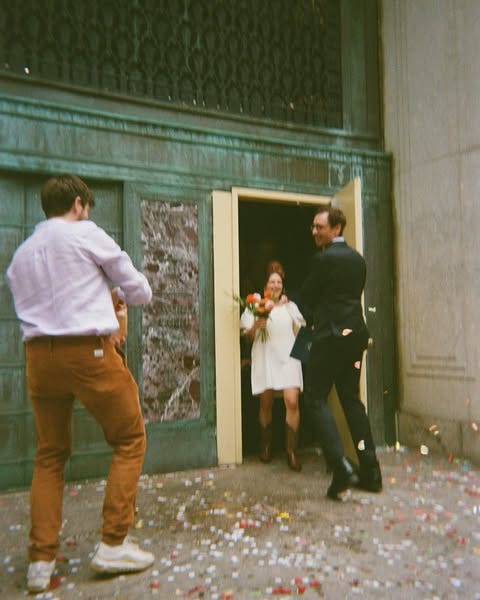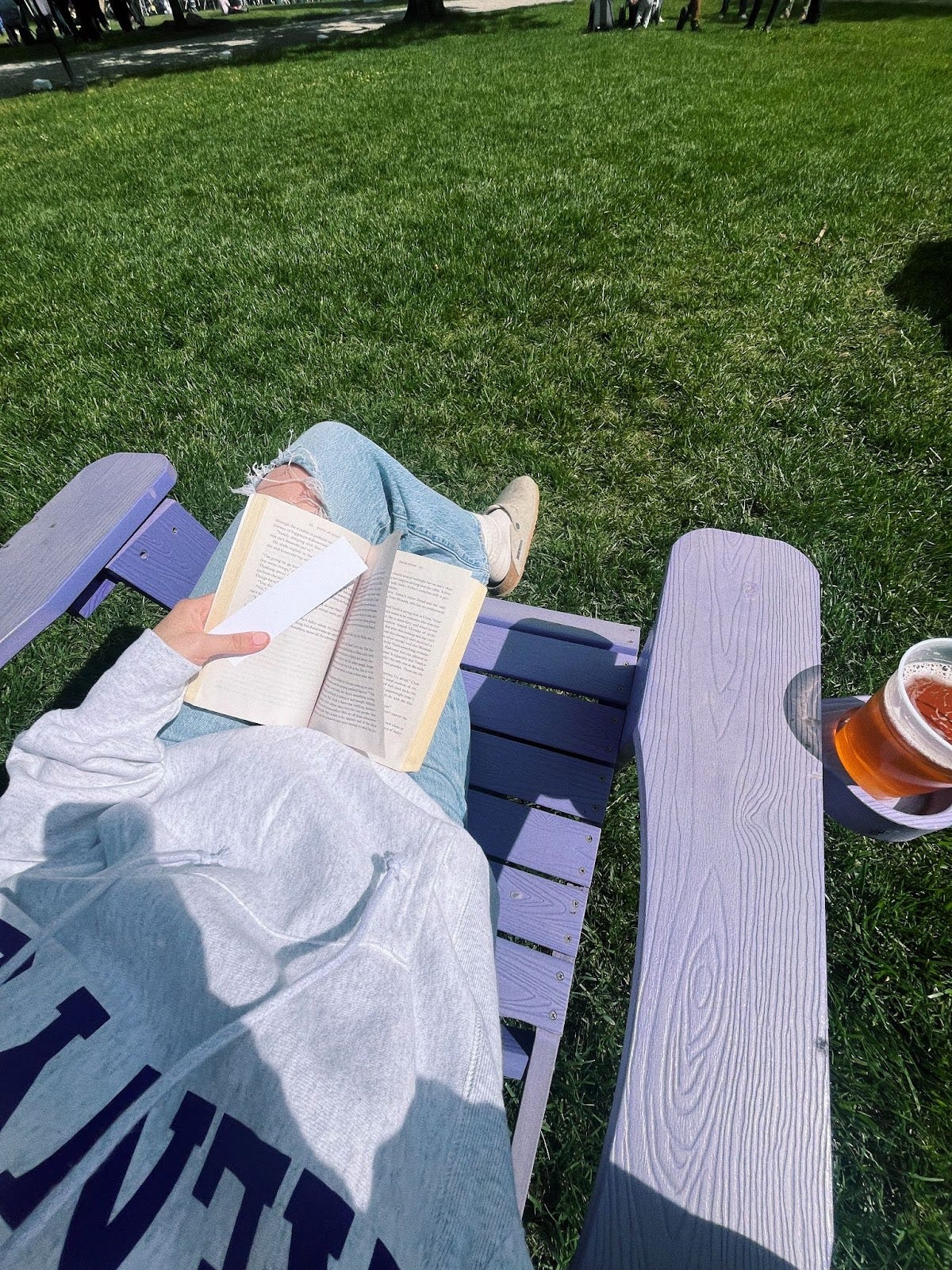Embedded is your essential guide to what’s good on the internet, written by Kate Lindsay and edited by Nick Catucci.
Finally, an excuse to post my wedding photos again. —Kate
Last weekend, influencer Jaz Smith posted more than 20 TikTok videos from her wedding. The videos, posted in real time to her over 400,000 followers, were, according to a follow-up video, meticulously planned in a spreadsheet and outsourced to an assistant.
 Tiktok failed to load.
Tiktok failed to load.Enable 3rd party cookies or use another browser
Combined with the many videos that the influencers in attendance also posted, the blitz understandably gave the impression that Jaz spent her entire wedding on her phone. The content was so pervasive it earned a write-up in The Cut and Jaz an additional 100,000 followers. “I feel like she is getting married just for attention / social media content,” one of what felt like thousands of posts on r/nycinfluencersnark read.
People in The Cut’s Instagram comments compared the wedding to a Black Mirror episode, writing things like, “one of the most intimate moments of life is nottt content for worldwide consumption.” I’m sorry, but since when?
Weddings in the United States are a $70 billion industry. These celebrations can span days, taking place in far-flung locations, with elaborate floral arrangements and live bands and dress changes and after parties and food trucks and swag you get to take home. I know this not just because I’ve lived it, but also because I see it. Everywhere! And especially online.
I got married in September and my sister is getting married this summer. We could not be more different in our approach to the celebrations, but still share one identical goal: We want that shit documented. In my case, I handed out disposable cameras to the friends who met us outside the courthouse. My sister is hiring a professional photographer. I posted mine on Instagram and so will she.
While marriage may be an intimate bond (although in our case, the license was given to us by a clerk wearing a “my strawberry jams but my glock don’t” t-shirt), weddings are, and have almost always been, a performance. You’re performing for your family, for your friends, and even each other, because saying our vows was the first and last time my husband and I will ever speak to each other in that bizarre, formal manner. People used to show their photo albums to other people; now they go directly online. How is having an assistant document and post videos of the wedding to TikTok any different than accepting a WeTransfer link from the photographer?
Perhaps it’s the real-time nature of these posts that rubbed some the wrong way, but Jaz is not a nurse who married an account manager. She’s a lifestyle influencer. To not share her wedding would have felt like a betrayal to her followers, and pulling off this real-time documentation was a great boost for her career. Marriage, in the words of Greta Gerwig’s Amy March, began as an economic proposition, after all. Matches were made to secure dynasties and boost fortunes. If anything, Jaz using her own wedding to increase her business success was the most historically authentic part about it.
But even if she weren’t an influencer, or even if the videos flopped and made no impact on her career, I’d still be defending Jaz’s choice to so diligently preserve these memories. People may claim this focus on documentation meant she wasn’t “living in the moment,” but I’ve come to learn the moment leaves you either way.
While Jaz was at her wedding, I was at my college reunion. Due to COVID, this was my class’s first reunion in 10 years. When I arrived back on campus, pulling up the hill I spent four years traipsing across, I was waiting for something to fall into place. Movies and TV shows taught me that these kinds of significant, emotional returns are accompanied by an orchestral swell, or visions of the ghost of my 19-year-old self around every corner. So much was the same and yet I was so different, and it felt like I should have been experiencing the full meaning of that. But that meaning is never handed to you—you have to make it.
I tried to look extra hard at buildings, really listen to the church bells that continue to chime every fifteen goddamn minutes. I was reminded of something I wrote the week before graduation, that has now been (ironically) lost to time. It was something like, “I don’t want to take this place for granted, but I don’t know what not taking something for granted feels like.” I settled then, as I did last weekend, on taking pictures.
The memories captured through our phones are the closest approximation we have to being able to hold on to a moment. Ten years have passed since I graduated, but I can, in a makeshift way, bring myself right back to that time before the rest of my life had happened. You can really get lost in these digital relics, tapping through your Instagram Story archive until you’ve essentially relived an entire year of your life. I, too, cringe when I see people watch concerts through their phones or refuse to unplug during social gatherings. But the thing about memories is you can’t choose which ones you don’t forget.
The significant in-the-moment moments of my life aren’t gone entirely, but increasingly feel like the outline burned into the back of my eyelids after looking at the sun: there, kind of? And then gone. I can still retrieve the gist of them on demand, but I’ll never live in them again. We don’t tell students at a lecture to “live in the moment” in order for them to remember what they need to know. We tell them to take notes.
The ephemeral nature of some of these memories is what makes them feel important, and I do still find value in that. But when someone whips out their phone, while they may be making the choice to sacrifice “living in the moment,” that doesn’t mean they’re choosing to miss it. They’re compromising, in whatever ways, so they can keep it with them forever.








I agree mostly when it comes to big life events but I feel like culturally we've become so obsessed with memorializing everything and anything. I think it's ok, normal even, to lose things to the annals of time. Forgetting is a natural part of the human experience.
I also personally have felt that trying too hard to capture the moment results in me enjoying said moment a lot less, the reason why I've stopped recording every concert I go to. Going back to watch the video (which I rarely do, if ever) represents such a small fraction of the joy I experienced when I was actually there. But it makes me wonder if some people (i.e. content creators) are just built different. Maybe to them, documenting every little moment IS in fact enjoyable, and adds to the experience in a way it just doesn't for other people.
Fantastic analysis and observations. You often cause me to change my mind about things. Young badass!